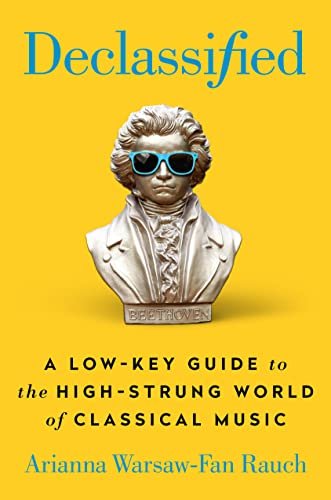Declassified: A Low-Key Guide to the High-Strung World of Classical Music
—Cathy Ritchie
Declassified: A Low-Key Guide to the High-Strung World of Classical Music
by Arianna Warsaw-Fan Rauch (GP Putnam’s Sons, 2022)
The hills and shelves are alive with books declaring themselves the answer to the challenge of “how to understand & enjoy classical music.” But I’m willing to wager only one such volume boasts a cover with a bust of Beethoven decked out in shades!
In Declassified: A Low-Key Guide to the High-Strung World of Classical Music, violinist Arianna Warsaw-Fan Rauch offers quite a winning hybrid: a personal memoir; a factual guide to the nuts, bolts, and basics of stereotypically high-toned music; and even some practical recommendations for the use of said music in everyday life—all of it consistently delivered with a charming snarkiness that never becomes excessive. The book’s cover is indeed a signal that her text is not your average high school/college music appreciation textbook!
Rauch deeply loves classical music, and has nurtured that passion with years of training and accomplishment, including degrees from Julliard and career performances around the world as both an instrumental soloist and a player with orchestral and chamber groups. But she eagerly accepts the notion that lovers of Bach and Brahms can also embrace Beyonce and Chris Botti—and decries the notion that everyday music lovers should assume that the “classical” stuff is beyond their understanding.
As she states in her introduction: “Classical music was composed for people—not aficionados. There was no special education required back in Mozart’s time in order to enjoy it. You are every bit as qualified as the people who were sitting front and center at the premiere of Beethoven’s Fifth. But you’ve been told that classical music is stuffy and boring and intellectual—and Not For You. I’m here to tell you that nothing could be further from the truth.”
With brief echoes of every other music appreciation text you might come across, Rauch offers (admittedly light-hearted) instruction in the seven main compositional periods; an outline of the standard instruments and their theoretical personality types (prepare for snark!); how to recognize and analyze symphonies, concerti and chamber music; and “how to be a listener,” of both live concerts and recordings But she also gifts us with several detours off the beaten path, including an analysis of classical music’s “popular archetypes” (e.g., brass players are frat boys, and wind players are cat people); and guidance as to the best classical “wedding music,” leaving Pachelbel’s Canon far, far behind in the dust. She also provides a plethora of recommended pieces “to check out” in each chapter, and an extensive technical glossary.
Rauch hesitates not a jot in sharing her personal opinions throughout. For example, she loathes “medieval” music of any genre, Hildegard Bingen included (and don’t get her started on Gregorian chant!). She reminds us constantly that she detests Richard Wagner as a person, and has concluded that too many conductors are a**holes—though she also notes that exceptions to that rule (fortunately) abound.
Rauch’s writing skill allows her to entertainingly meld her more objective, pedagogical moments with interesting vignettes from her personal and professional lives, as she sprinkles caustic-though-never-cruel comments within her pages like bright splashes of seasoning. Rauch’s genuine love for classical music shines brightly on every page, but she also has one foot planted firmly in the real world, and an appreciation for those uncertain folks who might just need a well-intentioned nudge into the unknown. I appreciated her excellent effort tremendously.
Fortunately, readers can also experience Rauch’s charm “live” thanks to YouTube, including footage of her professional performances and recent interviews about the book.
Arianna Rauch’s efforts on behalf of the classical-musically-challenged are both enjoyable and likely to make an impact. And those current fans of the genre who might just be in the market for a new perspective on the classical world from one who’s been there, and still is, will glean much from her lively book as well.

